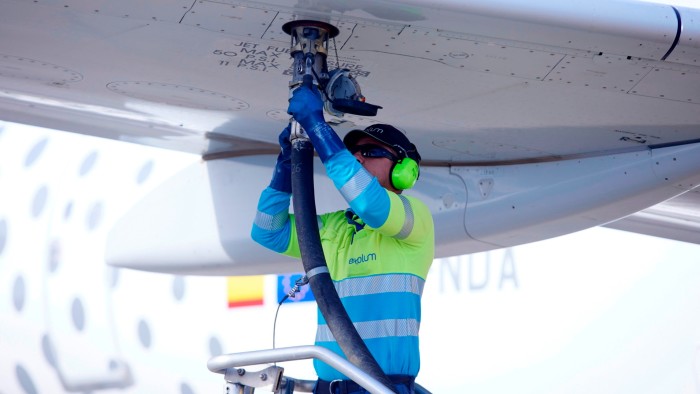Stay informed with free updates
Simply sign up to the Oil & Gas industry myFT Digest — delivered directly to your inbox.
Europe imported record amounts of jet fuel from Asia over its peak summer holiday season, helping to push prices down and underlining the increasing market dominance of Chinese and South Korean refineries.
Almost 11.5mn barrels of jet fuel were transported from east to west so far in August, according to data from Vortexa, an energy data company. While orders peaked in June and July, flows remain elevated.
“We have record arrivals from the Far East if you look at the amount of [jet fuel] loading out of China and Korea, and that’s both a pull and push,” said one senior jet fuel trader, who asked not to be named, referring to European demand and strong Asian supply.
Refineries in China have increased their output this year, particularly of jet fuel, as the country’s rapid shift to electric vehicles damps demand for gasoline and diesel.
“Chinese refiners have decided that jet fuel is going to be their product of choice,” said Amaar Khan, who covers jet fuel at pricing agency Argus. “Supply has just been enormous this year,” he added.
Combined with lower crude oil prices, the surge has pushed summer jet fuel prices in Europe to their lowest level since the coronavirus pandemic.
European demand for jet fuel has also outpaced that in Asia and the US, and is now back to pre-pandemic levels. According to air traffic control body Eurocontrol, the number of flights in Europe is expected to be at least 5 per cent greater than in the summer of 2024.
The price of jet fuel has fallen from more than $1,200 a tonne in the summer of 2022 — when Russia’s full-scale invasion of Ukraine prompted a surge in oil prices — to about $700 today.

“We think that’s about where it will stay [in the medium term],” said Michael O’Leary, chief executive of Ryanair.
“Generally there’s been an overhang of fuel supply across the world,” he said. “There’s an oversupply of oil . . . particularly because Opec+ keeps increasing production, and there’s reduced demand because the Indian and Chinese economies haven’t fully recovered.”
A new generation of large, lower-cost Asian refineries is squeezing Europe’s ageing plants, prompting a wave of closures. Earlier this month, airline lobby group Iata warned that Europe was becoming increasingly reliant on imports as its refineries shut down.
“As you get more European refineries closing down or being put out of business by newer, more modern, shinier refineries in the Far East, the natural flow of events is that you get more oil coming from the Far East,” said the jet fuel trader.
“A few years ago, if you had anything like this volume coming from the Far East to Europe, you would be looking at an oversupply but I don’t think that’s the case at the moment.”

